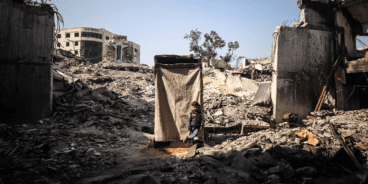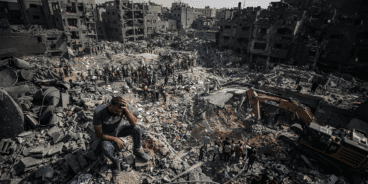
Crafting a Role for IBSA on Mass Atrocity Prevention
In the September 2013 edition of the Commonwealth Human Rights Initiative’s Newsletter, Naomi Kikoler, Global Centre Director of Policy and Advocacy, writes on the role that IBSA countries (India, Brazil, South Africa) can play in mass atrocity prevention.
Today, there is an urgent need to identify potential partners within the emerging powers to help advance efforts to prevent mass atrocities. This is rooted in the recognition, particularly post Libya, that the States taking the lead on advancing “Never Again” and the corresponding political commitment to the Responsibility to Protect (R2P) can no longer be the usual suspects, notably Western States.
Preventing mass atrocities requires a multilateral effort that is predicated on discussions between actors from both the Global North and the Global South to build and crucially maintain support for preventive and protective action. The IBSA States (India, Brazil and South Africa) can, and should, together serve as the interlocutors and instigators of dialogue between Southern and Northern States for moving this agenda forward, especially in regards to prioritising prevention.
Amongst the emerging powers, the IBSA States may be seen as credible voices on issues that involve the intersection between human rights and sovereignty such as halting and averting mass atrocities. This is in part because of their status as large multi-ethnic democracies that have struggled to entrench human rights domestically and continue to adhere to traditional notions of sovereignty. Their commitment to multilateralism including United Nations (UN) peacekeeping, growing economic might and UN Security Council aspirations, are all factors that make these three States the most appealing voices within the emerging powers on peace and security issues.
Many would like to see the IBSA States establish a role for themselves oriented towards crisis response; yet expectations in this regard should remain modest. These States are unlikely to abandon their affinity to traditional notions of sovereignty, respect for non-interference in the internal affairs of States or discomfort with the use of force to protect civilians. In practice, this means that they will continue to resist employing the naming and shaming tactics favoured by Western States and the use of coercive measures; favouring instead, calls for quiet diplomacy, negotiation and mediation including when parties appear intransigent.
Furthermore, it may be fair to say that the IBSA States are illequipped today to play a central role in crisis response, particularly in situations involving the use of force. No longer on the UN Security Council they will be on the periphery of future UN Security Council decisions to authorise sanctions, arms embargoes or the use of force. While their position as troop contributors (TCC) to peacekeeping missions will mean that they will be consulted on issues regarding peacekeeping, their TCC status is inadequate to engender sufficient influence in UN Security Council decision-making.
Similarly, there are questions about IBSA’s ability to be a leader in preventive diplomacy during crisis situations, as can be seen with the unfolding mass atrocities. In August 2011, IBSA sent a delegation of deputy Foreign Ministers to Damascus to try to resolve the situation. Expectations for their trip from fellow UN Security Council members, including the P3 (France, United States and United Kingdom) were high. The visit resulted in no changes on the ground and IBSA’s failure to follow up left many sceptical of its ability to lead in such situations. It also raised pertinent questions about the degree to which the IBSA countries have the leverage needed over State and non-State actors to dissuade them from perpetrating mass atrocities – especially outside their own regions.
What type of “voice” then should the IBSA States have on the prevention of mass atrocities?
IBSA States should establish a strategy that reflects their own values. This includes an emphasis on serving as a bridge for dialogue, supporting UN peacekeeping and building States’ capacities to protect their own populations through prioritising prevention.
- IBSA States should serve as a bridge for dialogue between Northern and Southern States on contentious issues: Brazil, largely absent from discussions on R2P for years, in the wake of the NATO intervention in Libya, introduced to the UN membership the concept of, Responsibility While Protecting (RwP). RwP called for greater transparency in the implementation of UN Security Council’s use of force mandates. The Brazilian initiative, supported by India and South Africa, served as a bridge between Northern and Southern States to discuss concerns about the implementation of use of force mandates to protect civilians from mass atrocities. Taking a lead on difficult normative questions related to prevention of mass atrocity is one possible role for IBSA States. Yet again, expectations must be modest. Though Brazil has failed to translate RwP into serious policy change and has apparently dropped it as a priority, its brief contribution did help Member States to move forward after Libya on the implementation of R2P.
- IBSA States should continue to commit troops to UN peacekeeping efforts and support protection of civilian mandates: By continuing to support UN peacekeeping, the IBSA States will make a significant and tangible contribution to mass atrocity prevention. Increasingly, peacekeeping missions are mandated with explicit Chapter 7 “protection of civilians mandates” which allow peacekeepers to use force to save lives. All three IBSA States are troop contributors to UN peacekeeping. Brazil currently has 1,713 serving troops, South Africa has 2,080 and India has 7,878 troops. All three countries have suffered casualties in the course of their service and have shown remarkable resolve in their willingness to continue to commit troops. India has lost 154 peacekeepers, Brazil 40 and South Africa 34. Most recently a Brazilian general was appointed to a new UN intervention brigade in the Democratic Republic of the Congo. Brazil’s support of his candidacy is an important sign of growing comfort with using force, albeit in a consensual setting, to save lives. Their belief in the importance of peacekeeping is something that unifies the IBSA States. They could also play an influential role in shaping normative discussions on the future of peacekeeping in addition to continuing to commit troops to future missions with protection of civilians as the mandate.
- IBSA states should prioritise and champion a prevention agenda: One area where the IBSA States can make a contribution is the prevention of mass atrocities. While there is considerable rhetorical support from States for preventive efforts, there is little real action. Unless States begin to do so as part of the R2P agenda, R2P will continue to be mired with controversy. The IBSA States could play an important leadership role in calling for, and working with, States and regional actors to establish and strengthen the architecture for prevention that is critically needed to avert mass atrocities before they begin. This reflects their own values and is an area where they could have a competitive advantage. Each country can draw on its own lessons learned from its difficult processes of transition and efforts to address impunity and uphold domestic human rights. They can share these experiences in an honest and frank manner with States at risk and offer assistance to help governments implement reforms and/or de-escalate crisis situations.
IBSA States will increasingly be asked and expected to play a greater role in mass atrocity prevention. While their tendency will be to seek a role in crisis response, IBSA’s contributions would be best oriented towards those areas where they could truly have a competitive advantage – especially when compared with Western States. This includes serving as a bridge for dialogue, supporting UN peacekeeping and building States’ capacities to protect their own population through prioritising prevention.
Related Content


Atrocity Alert No. 440: Israel and the Occupied Palestinian Territory, Protection of Civilians and Libya
